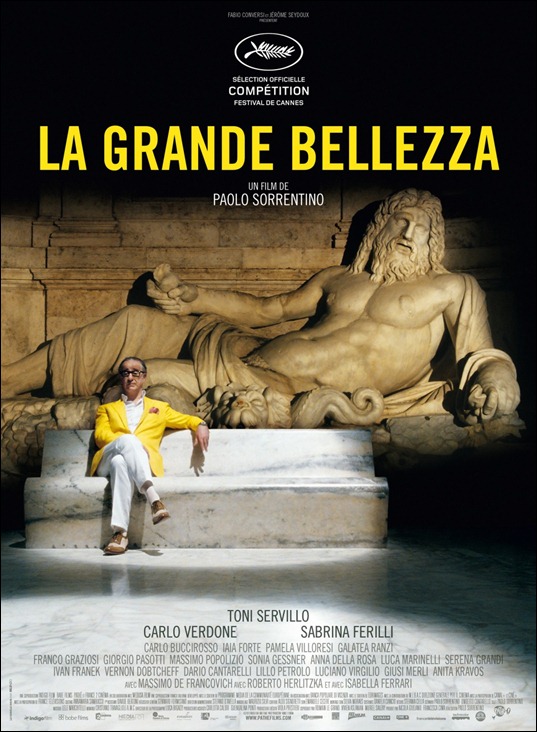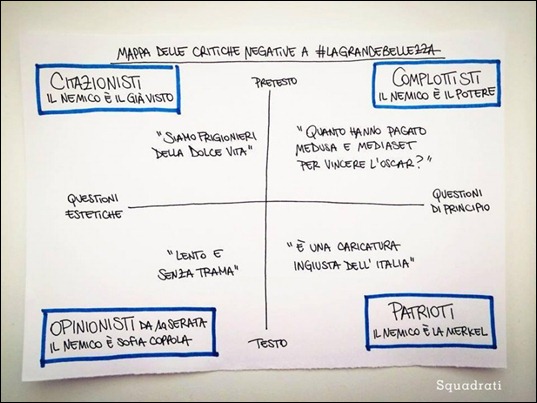Una Grande Bellezza? Posted by Serena on Mar 10, 2014 in Culture
It won an Oscar for best foreign language film of 2014, The Golden Globe Award and the BAFTA, but is really all that good?
Let me state right here and now that I haven’t actually seen La Grande Bellezza (The Great Beauty), directed by Paolo Sorrentino. But after it was screened at the Cineforum here in Pontremoli I began to hear some feedback from friends:
Alda: “La fotografia è bellissima, le immagini stupende, gli attori bravissimi, d’accordo, ma della storia di questa gente non me ne potrebbe fregare di meno” (The photography is wonderful, the images absolutely beautiful, the actors excellent, sure, but I couldn’t give a damn about the story of those people)
Chiara (had already seen it on TV): “Cinque minuti e ho girato” (Five minutes and I changed channel)
Maria Grazia: “La prima parte mi ha scioccata … tutte quelle orge, quelle abbuffate, una vita così vuota e basta. Poi la seconda parte, quando si è inserita la storia della Ferilli, allora si è capito che c’era una storia. Allora mi è piaciuto, la seconda parte mi è piaciuta” (The first part shocked me … all those orgies, all that stuffing food in, such an empty life and that’s it. Then in the second part, when Ferilli’s story came in, then you realised that there was a story. Then I liked it, I liked the second part)
Nicoletta: “Sono d’accordo sulla prima parte del commento di Maria Grazia, cioè che all’inizio è scioccante e solo nella seconda parte del film si capisce la storia, ma non ho ancora deciso se mi è piaciuto” (I agree with the first part of Maria Grazia’s comment, that at first it’s shocking, and only in the second part of the film you understand the story, but I still haven’t decided if I liked it)
Annalisa: “Non riesco a catturarlo, ma qualcosa di bello c’è” (I can’t grasp it, but there is something beautiful in it)
Vilma: “Il film è bello perché è aperto ad ogni interpretazione, sia positiva che negativa. Ad ogni personaggio puoi dare un significato che per un altro spettatore sarà diverso. La Grande Bellezza è bello perché ogni persona può vedere nel personaggio di Toni Servillo (che tra parentesi è un attore eccezionale) tutto quello che vuole. L’apertura del film con questa danza così frenetica e dissoluta ha un duplice significato per me, rappresenta il disordine italiano, ma i colori, che sono bellissimi, nella grande confusione c’è però bellezza, la bellezza di un creato” (the film is lovely because it’s open to any interpretation, both positive and negative. You can give a meaning to each of the personalities that’s different from the meaning of someone else who’s seen it. The Great Beauty is good because everyone can see in the character played by Toni Servillo (who is an ‘exceptional actor’) anything they want. The opening of the film, with the mad riotous dance, has a double meaning for me, it represents Italian disorder, but the colours, which are lovely … in the great confusion, there is however beauty, the beauty of a creation)
Everyone seemed to agree on one point: “Troppo lungo!” (Too long!)
There has also been a lot of criticism of the film on Italian social networking sights, as shown by the following chart from La Repubblica online newspaper.
Have you seen the film, and if so what did you think of it? Please leave a comment.

Build vocabulary, practice pronunciation, and more with Transparent Language Online. Available anytime, anywhere, on any device.






Comments:
Allan Mahnke:
Yes, we saw it and think it is one of the most beautiful visual essays we have seen for a very long time. There is a procession of ideas rather than a simple plot. Those who think the film unkind to Italy apparently didn’t get it. It is a kind of homage to Italy as the source for much of our culture. As the Mother Teresa figure tells Jep, “I radici sono importanti,” and there are very few roots as important to us as those found in Italy, whatever and wherever we call home.
Jill:
I saw this movie at Seattle’s Italian film festival last fall. I have fond memories. Just before the show started, there was a raffle. One thousand tickets were in the box and our name was drawn. We won a trip to Italy. It was hard to focus on the film, but I remember thinking how gorgeous Rome is and how I couldn’t wait to return. I liked the movie and will watch it again. Thanks for another great blog post.
Philippa Davern:
Mi piace molto i commenti di Vilma. Sembra che lei ha detto tutto che avrei voluto dire! Grazie Vilma e grazie Serena.
Guest:
I really enjoyed it. It’s not a perfect movie but I couldn’t take my eyes off it. I found the characters to be very watchable and some of the dialogue just fantastic. The main character was perfectly cast, in my opinion.
To say it lacks plot is somewhat unfair since it’s obviously not a plot-driven movie; it’s more a character study that’s beautiful and artistic.
To say it’s a “caricatura ingiusta” of Italy is simply ridiculous. In no way is the viewer led to believe that most Italians are like these characters. No one would think this is a snapshot of normal Italian life. C’mon. Maybe a fracton of 1% live like this. I have no idea, but this movie is very obviously not a commentary on the average Italian. I think so many people today, with the cult of celebrity that exists in our world, think they’d love to live a jet-set, party-all-the-time lifestyle but in reality there’s a lot of emptiness, loneliness, and superficiality in it. This film addresses that concept, among others.
I loved the “Saint” at the end; she further illustrated the point of the film. Here was a woman who had lived a totally poor life, eating simply, sleeping on a pallet, and yet she turned out to be so profoundly connected to existence, evidenced by her comments about roots and the flamingoes reaction to her.
Also, the simple couple (Jep’s ex-lover’s husband and his new girlfriend) were held in awe by Jep when they outlined the very simple evening they had planned, i.e. finishing the ironing, eating something, watching tv, etc.
It’s not a film for everyone, but it was so beautifully shot, acted, and written, that I’m happy it won Best Foreign Film.
Serena:
@Guest Grazie per l’analisi molto bella e intelligente del film. Anche la mia amica Annalisa è rimasta molto affascinata dalla figura della Santa.
Saluti da Serena